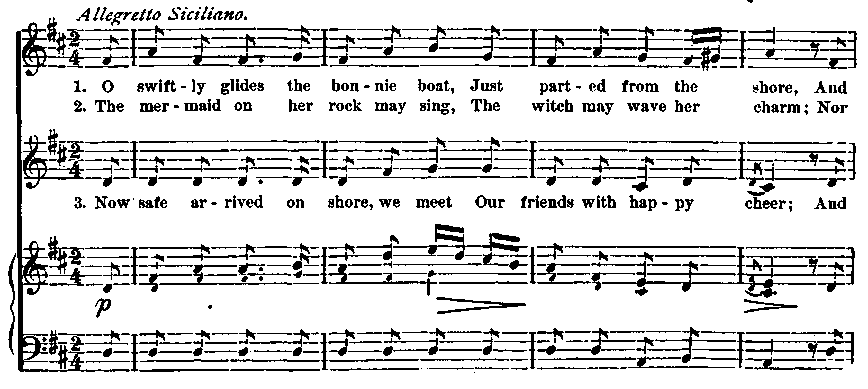Familiar Songs - Their Authors & Histories
300 traditional songs, inc sheet music with full piano accompaniment & lyrics.
| Share page | Visit Us On FB |
|
O SW1FTLY GLIDES THE BONNIE BOA Tl 61
to boarding-school, and there became famous as a story-teller. Her tales would draw alternate tears and laughter from the schoolgirls. She also established a kind of private theatricals, in which she was playwright, costumer, scene-shifter, and principal actor. When she was about fifteen, her father became Professor of Divinity in Glasgow University. After his death, Dr. William Hunter, a bachelor uncle, settled the family upon a small estate in Lanarkshire. Here Joanna learned the writings of the British dramatists, especially Shakespeare, almost by heart, although she was not a wide reader, and here she wrote some Scottish songs, and adapted them to old melodies. The death of the uncle caused the family to remove to London, where Joanna's brother was a physician of distinction. There, in 1790, she published a volume of miscellaneous poems, which was not successful. Soon after, the conception of her first drama flashed into her mind, and with it the belief that she had found her true mode of expression. Her plays found favor slowly; and finally one of them, "De Montfort," was acted at Drury Lane, by John Kemble and Mrs. Siddons, but their genius could not supply the lack of incident. She afterward wrote a tragedy, entitled " A Family Legend," which was acted in Edinburgh, with a prologue by Scott, an epilogue by Mackenzie, and Mrs. Siddons and Terry in the cast. It was favorably received through ten performances, and Sir Walter, writing to Miss Baillie about it, said: "You have only to imagine all you could wish, to give success to a play, and your conceptions will still fall short of the complete and decided triumph of the ' Family Legend.' The house was crowded to a most extraordinary degree; many people had come from your native capital of the west; everything that pretended to distinction, whether from rank or literature, was in the boxes; and in the pit, such an aggregate mass of humanity as I have seldom, if ever, witnessed in the same space." But Miss Baillie's plays, although pleasant dramatic poems, had not incident and action enough to keep the stage. Each play delineated a single passion of the human soul.
She is described as a woman who would have been attractive even if she had had no reputation. She was religious and benevolent, and all the nobler virtues shone forth through an intelligent and pleasant face. Most of her songs occur in her plays. She lived quietly in Hempstead, for many years after all her friends were gone. In one of her later letters, she writes: " For me, the walking through our churchyard is no unpleasant thing; it cannot extinguish the lights beaming from the promised house in which are many mansions." She died, February 23, 1851.
The words of Miss Baillie's song, " 0 swiftly glides the bonnie boat," were probably adapted to the old Scottish melody by the author herself. |
||
 |
||